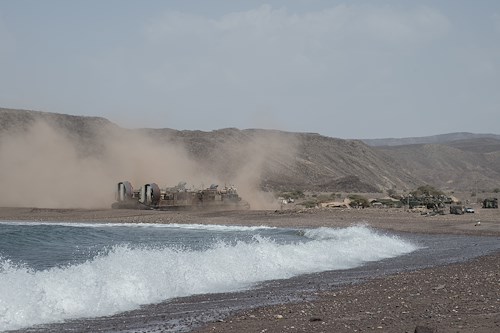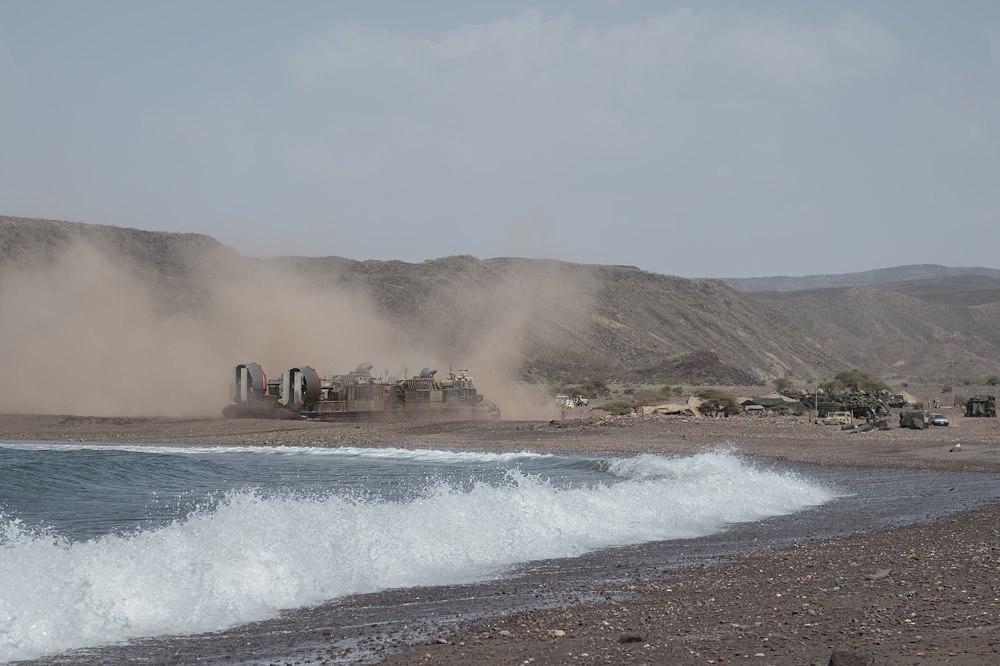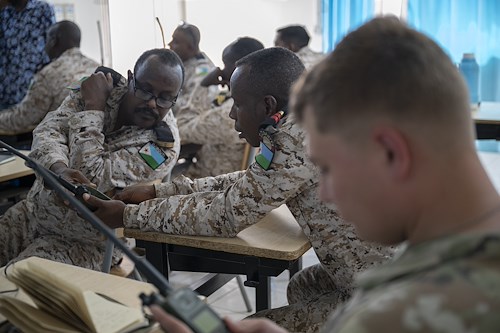Gallery contains 3 images
×
Photo 1 of 3
CJTF-HOA supports CENTCOM’s Alligator Dagger exercise
U.S. Marines from the 15th Marine Expeditionary Unit convoy troops and supplies during Alligator Dagger – a two-week exercise that prepares incoming Naval Amphibious Forces, Task Force 51/5th Marine Expeditionary Unit's Amphibious Ready Group/Marine Expeditionary Unit teams to integrate and synchronize warfighting capabilities in the U.S. Central Command's area of operations. Approximately 2,000 Sailors and Marines from the America-class amphibious assault ship USS America (LHA 6), the command ship for Amphibious Squadron (PHIBRON) 3; USS Pearl Harbor (LSD 52); USS San Diego (LPD 22); USS Lewis B. Puller (ESB 3); Battalion Landing Team 1/5; Aviation Combat Element VMM-161 (reinforced) and the Logistics Combat Element CLB-15 are participating in the third iteration of this exercise. (U.S. Air National Guard photo by Tech. Sgt. Joe Harwood/Released)
Photo by: Tech. Sgt. Joe Harwood
Photo 2 of 3
CJTF-HOA supports CENTCOM’s Alligator Dagger exercise
U.S. Marines from the 15th Marine Expeditionary Unit convoy troops and supplies during Alligator Dagger – a two-week exercise that prepares incoming Naval Amphibious Forces, Task Force 51/5th Marine Expeditionary Unit's Amphibious Ready Group/Marine Expeditionary Unit teams to integrate and synchronize warfighting capabilities in the U.S. Central Command's area of operations. Approximately 2,000 Sailors and Marines from the America-class amphibious assault ship USS America (LHA 6), the command ship for Amphibious Squadron (PHIBRON) 3; USS Pearl Harbor (LSD 52); USS San Diego (LPD 22); USS Lewis B. Puller (ESB 3); Battalion Landing Team 1/5; Aviation Combat Element VMM-161 (reinforced) and the Logistics Combat Element CLB-15 are participating in the third iteration of this exercise. (U.S. Air National Guard photo by Tech. Sgt. Joe Harwood/Released)
Photo by: Tech. Sgt. Joe Harwood
Photo 3 of 3
CJTF-HOA supports CENTCOM’s Alligator Dagger exercise
U.S. Marines from the 15th Marine Expeditionary Unit participate in Alligator Dagger, a two-week exercise that prepares incoming Naval Amphibious Forces and Task Force 51/5th Marine Expeditionary Unit's Amphibious Readiness Group/Marine Expeditionary Unit teams to integrate and synchronize warfighting capabilities for missions in the U.S. Central Command's area of operations. Through cooperation with U.S. Africa Command, Combined Joint Task Force - Horn of Africa, and the Djiboutian government, these Sailors and Marines made use of ranges near Camp Lemonnier, Djibouti, as well as used the camp's facilities and resources, to exercise amphibious assault capabilities and coordinate their efforts for successful joint operations. (U.S. Air National Guard photo by Tech. Sgt. Joe Harwood/Released)
Photo by: Tech. Sgt. Joe Harwood
The Combined Joint Task Force – Horn of Africa recently provided support and coordination for Naval Amphibious Forces, Task Force 51/5th Marine Expeditionary Brigade, during Alligator Dagger, a two-week exercise hosted in and around Djibouti several times a year to integrate and synchronize warfighting capabilities.
"Although CJTF-HOA did not lead this exercise, we know this terrain and have established relationships to ensure proper coordination with appropriate organizations," said U.S. Navy Lt. Cdr. Gary Portis, an exercise planner within the CJTF-HOA Training, Exercises, and Ranges Directorate. "We worked closely with the USS America Amphibious Readiness Group and the 15th Marine Expeditionary Unit to allow for the smooth execution of this amphibious exercise. We assisted them with access to Camp Lemonnier's facilities, vehicles, and equipment; coordinated their use of the range here with the U.S. Embassy and the Government of Djibouti; as well as assisted with giving them specialized support from CJTF-HOA's communication and public affairs directorates."
Alligator Dagger is the largest regional amphibious exercise of its kind and synchronizes TF 51/5’s warfighting capabilities and those of adjacent U.S. Naval Forces Central Command and Special Operations Forces units. It offers an opportunity for Navy and Marine Corps teams deployed to the U.S. Central Command area of responsibility to participate in rigorous integrated combat proficiency training. Specifically, this exercise enables the military to execute amphibious training, live-fire, Vessel Board Search and Seizure, Tactical Recovery of Aircraft and Personnel, as well as air assault evolutions.
This time, U.S. Marines of the 15th Marine Expeditionary Unit (MEU) disembarked from U.S. Navy ships in the Gulf of Tadjoura beginning Sept. 5 to storm a beach in a mountainous region of Djibouti. They came prepared to face the harsh environment without shelter, knowing that they would need to create their own water source to survive. They convoyed through the mountains and set up camp just as if they were in hostile enemy territory.
Firsts during this exercise included the use of a Landing Base/Platform and a Mine Hunting Unit with an Unmanned Surface Vehicle, both force multipliers that greatly increase TF 51/5’s ability to gain access to potentially denied coastal areas.
Marines involved spoke of the challenges that the heat and the conditions of the area posed, but fully understood the importance of the training.
"It's important to have experience in the ability to take the shore, by operating an assault from the ship to the land," said Sgt. Christopher Paezlopez, artillery Marine. "For some of us in the MEU, it's the first time doing this, and actually executing this solidifies the capability the Marines and the Navy have when taking on potential missions."
Through cooperation with the Djiboutian government, U.S. Embassy-Djibouti, U.S. Africa Command, and Combined Joint Task Force - Horn of Africa, these Sailors and Marines made use of ranges near Camp Lemonnier, Djibouti, as well as used the camp's facilities and resources, to exercise amphibious assault capabilities and coordinate their efforts for successful joint operations.
U.S. Marine Staff Sgt. Steven Andrews, range coordinator for the CJTF-HOA Training, Exercises, and Ranges Directorate, assisted U.S. Naval Forces Central Command with coordination for use of the beach and ranges in Djibouti.
"For them to be able to use the range, I have to coordinate with the Djiboutian and French militaries, find out the scheduling times, get them those slots, train up all their range safety officers and ensure they understand the range regulations and rules so they can not only clear the range but train safely," said Andrews.
Andrews went on to explain how CJTF-HOA and international partners in this region use the range with purpose.
"There are violent extremist organizations in Africa. For example in Somalia, which isn’t too far from here, you have al-Shabaab. Our presence here helps deter some of their activity and it also helps deter piracy in the Gulf of Aden,” added Andrews. “There is real world applicability to it, in the event of a crisis in a deployed environment it's going to be all U.S. branches of service and our international partners coming together. Being able to work together and train together allows us to perform well together."














